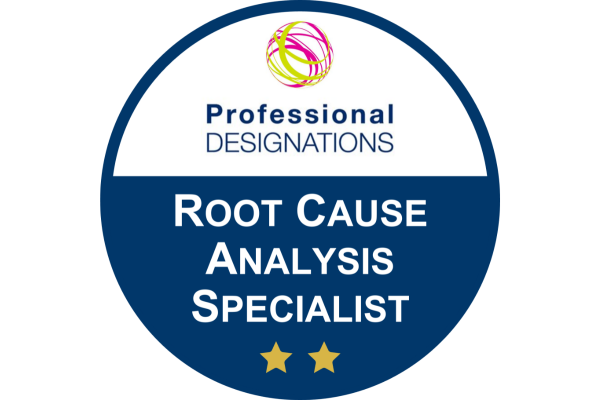
Problem Management: Root Cause Analysis Specialist

Every organisation has problems; however, not all businesses are proactive about preventing problems! You know what Problem Management is, but the real question is how do you do it?
This one-of-a-kind interactive certification course gives you practical learnings that you can immediately start to implement as soon as you get back to work.
This 2-day course is held in our virtual classroom with our expert instructor, meaning you can join the class and network with your peers from anywhere with an internet connection.
The hands-on course prepares you for the Professional Designations certification exam leading to the Root Cause Analysis Specialist Certificate in Problem Management. This certification will provide you with a practical, structured approach to applying established root cause analysis principles and techniques to identify the sources of recurring incidents and service downtime.
Every organisation has problems; however, not all businesses are proactive about preventing problems!
You know what Problem Management is… in theory. But, the real question is how do you do it?
Go beyond theory here! This one-of-a-kind interactive certification course gives you practical guidance that you can immediately start to implement as soon as you get back to work.
Attendees will gain the skills and knowledge they need to increase the efficiency and effectiveness of Problem Management and Incident Management through the application of root cause analysis techniques and principles.
Improving the ability to correctly and efficiently identify root causes provides a variety of benefits, among them:
Through instructor-led discussions, case studies, practical examples and group exercises, participants can expect to gain an understanding of the following:
Any individual charged with reducing and eliminating incidents and problems in the IT infrastructure.
There is no prerequisite for this course, however it is recommended that the participant be familiar with general problem management concepts as defined by IT Service Management.
The Problem Management: Root Cause Analysis Specialist exam is completed through Professional Designations Corp.
This is a 1 hour, closed book exam which consists of 40 multiple- choice questions - a passing score of 65% is required. The exam is completed online using a webcam and internet connection.
Material for this course will only be provided as downloadable soft-copy files that can be viewed on a variety of devices. Attendees may print a hard copy of the files in whatever format best meets their needs.
The following documents, downloadable in a ready-to-use format, will help you get a jump start on developing your Root Cause Analysis procedures:
Problem Management Specialist online exam voucher plus a complimentary Problem Management Specialist exam re-sit if you miss out on passing your certification the first time
A digital badge to share with your network upon passing your certification exam.
After completion of this course, you may apply for self-directed learning PDU's through PMI. A letter of attendance is available upon request.
This course enables participants to develop their knowledge and proficiency in the following Skills Framework for the Information Age (SFIA®) professional skills:
This list gives the core SFIA skills covered by the course. Elements relevant to other SFIA skills may also be included to a lesser depth. Proficiency in a SFIA skill is measured by performance assessment and is achieved through actual substantial use of that skill in a real-world situation over some time. In course assignments and exercises undertaken through a course can demonstrate elements of the relevant skills which can then be further developed back in the workplace. Acquiring new skills and building on existing skills, ideally occurs within the context of an agreed development plan for each person that ensures that their personal circumstances, strengths and development needs are met.
An amazing instructor who explained the content very clearly and at a very good pace. This was a good balance and approach to learning in a three day intensive period. I found the worked examples very practical and very relatable to the Defence industry sector I work in.
Satisfied Customer
Really good facilitation, kept me interested and shared so many practical applications.
Satisfied Customer
Gave me a better understanding of concepts, theories and tools to formalise and improve my current relationship management.
Satisfied Customer
The instructor was very professional and was able to explain each area thoroughly and is available for Q&A.
Satisfied Customer
Back to IT Service Management course